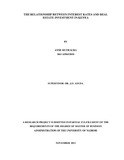| dc.contributor.author | Muthaura, Anne | |
| dc.date.accessioned | 2013-03-18T07:32:59Z | |
| dc.date.issued | 2012 | |
| dc.identifier.citation | Masters in Business Administration | en |
| dc.identifier.uri | http://erepository.uonbi.ac.ke:8080/xmlui/handle/123456789/14367 | |
| dc.description.abstract | The purpose of the study was to portray the relationship between interest rates and real
estate investment with a focus of Kenya. The real estate sector being one of the major
sectors of the economy in Kenya has been largely affected by fluctuating interest rates. The study sort to show case this effect by showing how house prices are affected by the cost of borrowing. Real estate is a large investment which requires huge capital that most ordinary Kenyans cannot raise, therefore they turn to banks to finance this cost of construction or purchase. The cost of borrowing in all banks is driven by the real interest rate which is fuelled or largely accommodates inflation. Inflation is the key driver of interest rates. The banks are highly supervised and are under the obligatory role of the Central bank of Kenya which determines the base lending rate accommodating all factors in the economy, based on this the bank can then come up with their own mortgage rates or borrowing rates a few basis points from the Central Bank lending rate.
The research problem was analysed through the use of the simple user cost model. The
target population of this study was all 35 mortgage lending banks in Kenya as at November 2010, from which a sample of 18 was drawn to analyse the research problem. Data for the purpose of the study was collected using data collection forms to 18 mortgage lending banks that have been running the mortgage product from 2007-2011.
Study findings indicated that indeed interest rates affect house prices, most real estate retail borrowers and investors alike are forced to increase the house prices to cater for the cost of borrowing and to also break-even.
The following recommendations are made. Firstly, the government should play a more
active role in control of interest rates through the Central bank of Kenya frequent bank
supervisions as most commercial banks are out to fleece lenders and stabilize inflation
through the implementation of tough monetary policies. Secondly, The property market
should be controlled through a house pricing index to protect the rights of both the owners
and the investors. Thirdly, the Central Market Authority should continuously review the
investors. | en |
| dc.description.sponsorship | The University of Nairobi | en |
| dc.language.iso | en | en |
| dc.subject | Real Estate investment in kenya | en |
| dc.title | The Relationship Between Interest Rates and Real Estate Investment in Kenya | en |
| dc.type | Thesis | en |
| local.publisher | School of Business, University of Nairobi | en |

